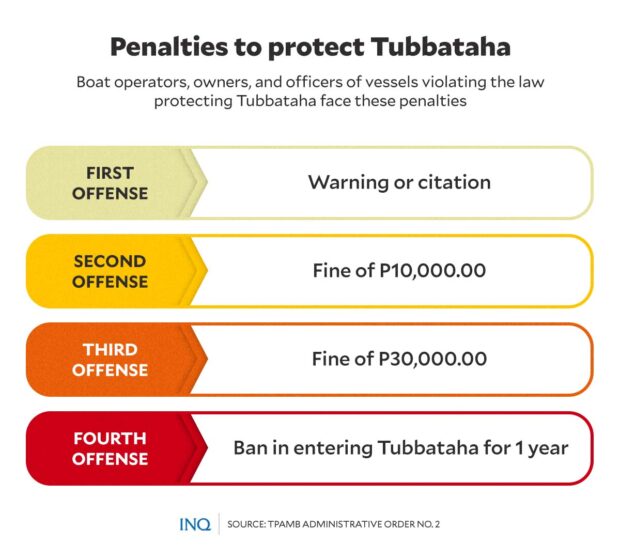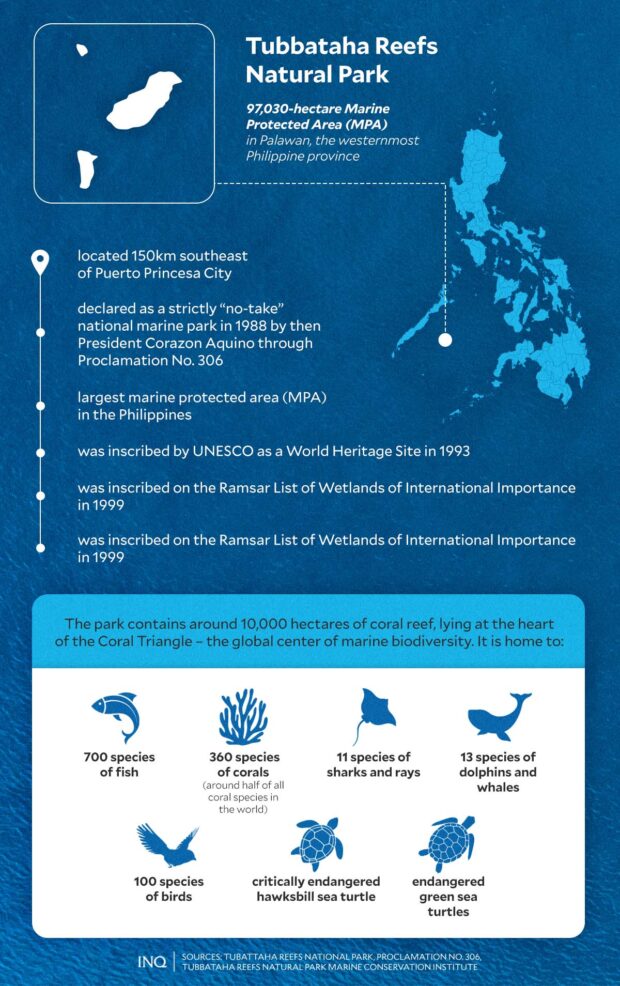Oceana lauds single-use plastic ban in Tubbataha Reefs Natural Park
MANILA, Philippines—An international ocean protection and conservation group lauded efforts to enhance the protection of Tubbataha Reefs Natural Park (TRNP) through a ban on single-use plastics in the entire area.
In 2019, the Tubbataha Protected Area Management Board (TPAMB)— the sole policy-making and permit-granting body for the Tubbataha Reefs— issued Administrative Order (AO) No. 02 banning single-use plastics in Tubbataha.
Since January of that year, anyone who enters the park is prohibited from using single-use plastics—water bottles, plastic cutleries, straws, stirrers, styrofoam cups and plates, and other items made of plastic.
Boat operators, owners, and officers of any vessel violating the order face these penalties:
- warning or citation on the first offense
- a P10,000 fine on the second offense
- a P30,000 fine on the third offense
- ban from entering TRNP for one year during the immediately succeeding diving season for the fourth offense
“We commend the efforts of the Tubbataha Management Office (TMO) and the Tubbataha Protected Area Management Board (TPAMB) for their pioneering work in declaring the ban of single-use plastics, the first among the nationally established MPAs in the country that commit to reduce plastic pollution in our ocean,” said lawyer Gloria Estenzo Ramos, Oceana vice president.
“The alarming presence of microplastics found in our coral reefs, seagrass, and commercially significant fishes and marine creatures should move our government to cohesively take action to ban single-use plastics at the national scale,” Ramos added.
Article continues after this advertisement
While the order was issued and effective in 2019, the lifting of lockdowns due to the COVID-19 pandemic prompted an enhanced information campaign to be relaunched this year.
Article continues after this advertisementOceana has been working with the TMO in enforcing AO No. 2 through awareness campaigns. On December 7, 2022, the international advocacy organization entered into a Memorandum of Agreement with the TPAMB.
Prior to this year’s dive season, dive boat operators informed their clients and guests of the order to ban single-use plastics through social media and other means before they board the boats.
“We laud the TRNP management body and the people responsible for the implementation of all measures that will render this UN World Heritage Site a showcase of ecologically responsible tourism efforts, not only in the Philippines but in the world,” said Ramos.
“Avoiding single-use plastics needs cooperative action from all the stakeholders, and we look forward to have more marine protected areas follow this sterling example of Tubbataha,” she added.
The organization and the TMO also reported receiving favorable feedback from visitors as a result of the enhanced enforcement of the order.
“Thanks to the ban on single-use plastics, the dive center provided reusable water bottles and eco-friendly bags,” said Jen Chua, a Filipino scuba diving icon who visited Tubbataha during the recent dive season.
“Under water, the marine environment appeared even more pristine, with no plastic debris in sight,” he said.
“The ban had transformed the diving experience, making it purer and more enjoyable,” said Chua.
“It was a reminder of the positive impact of responsible tourism and conservation efforts, ensuring Palawan’s, and by extension Tubbataha’s beauty for generations to come,” he added.
Aside from being a marine-protected area — the largest in the country — the Tubbataha Reefs Natural Park is also known worldwide as a scuba diving site, with its diving season lasting from March until June every year.
According to TMO, tourism plays a vital role in the conservation of Tubbataha.
The park entrance fees provide the funds to supervise and patrol the park. These fees are also used for educational campaigns that help create awareness and for the protection of the reefs.
READ: In Tubbataha, family of masked boobies growing with 2 new eggs
Rich marine biodiversity
AO No. 2 is just one of the various efforts to protect and conserve the rich reef ecosystem and biodiversity of the Tubbataha Reefs Natural Park.
The 97,030-hectare marine-protected area is located 150km southeast of Puerto Princesa City and lies at the heart of the Coral Triangle, the geographic center of world marine biodiversity.
In 1988, then President Corazon Aquino issued Proclamation No. 306 and proclaimed the Tubbataha Reefs Natural Park as a no-take national marine park, protecting and preserving the coral reef atoll, the marine turtles, and water birds in the area.
Years later, in 1993, Tubbataha was inscribed by UNESCO as a World Heritage Site and was recognized as one of the Philippines’ oldest ecosystems, with its pristine reefs and a high diversity of marine life.

In 1999, Tubbataha was inscribed on the Ramsar List of Wetlands of International Importance due to the outstanding variety of species present in the area and its important role as a habitat for fish, reptiles, invertebrates, and waterbirds.
According to TMO, Tubbataha is home to no less than:
- 700 species of fish
- 360 species of corals (around half of all coral species in the world)
- 11 species of sharks and rays
- 13 species of dolphins and whales
- 100 species of birds
- critically endangered hawksbill sea turtle
- endangered green sea turtles
“Tubbataha Reefs Natural Park is an important asset for global conservation, as 181 of the species found there are threatened to some degree, from Vulnerable to Critically Endangered,” the Marine Conservation Institute noted.
“Tubbataha is a breeding and rookery ground for many species of migratory and resident seabirds,” it said. These included frigate birds from Christmas Island, endangered green sea turtles and the critically endangered hawksbill sea turtle, the institute said.